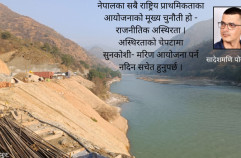Ambiguities of NRN citizenship
We use Google Cloud Translation Services. Google requires we provide the following disclaimer relating to use of this service:
This service may contain translations powered by Google. Google disclaims all warranties related to the translations, expressed or implied, including any warranties of accuracy, reliability, and any implied warranties of merchantability, fitness for a particular purpose, and noninfringement.


Non-resident Nepalis have been demanding dual citizenship for years. The constitution of 2072 could not provide for dual citizenship, but provided that non-resident Nepali citizenship can be given apart from political rights. It opened the way for non-resident Nepali citizens to take citizenship of millions of people who have taken citizenship of different countries, including about 75 thousand who have taken US citizenship.



A part is still determined to demand dual citizenship with political rights.
Article 14 of the Constitution provides that non-resident Nepalese citizenship can be granted, but Nepalese who have taken citizenship abroad spent almost 8 years under suspicion. The non-resident Nepali community was suspicious because the non-resident citizenship was said to be 'granted' and not 'granted' in the constitution. Therefore, political lobbying had to be continued to ensure non-resident Nepali citizenship.
The Nepal Citizenship (First Amendment) Bill, which the then President Bidya Devi Bhandari refused to certify, was certified only after Ramchandra Paudel became the President last May. It took a few months to prepare the rules and procedures for obtaining non-resident Nepali citizenship. After the regulations were published in the gazette last October, the distribution of non-resident Nepali citizenship started after the celebration of Dasain.
There is still some confusion regarding non-resident Nepalese citizenship. Various questions regarding this citizenship are still unanswered. There are also several ambiguities regarding the use of non-resident citizenship. The provisions made in the Citizenship Act and Regulations have not been fully followed.
According to the Citizenship Act, the applicant or his/her father or mother, father or grandfather, is a citizen of Nepal in the past, proof that the applicant renounced the citizenship if he/she had taken Nepali citizenship before, proof of citizenship of a foreign country, South Asian Regional Cooperation Organization There is a provision to submit an application to the designated authority with proof of residence in a country other than the member states and a letter of commitment to comply with the Constitution and laws of Nepal. In the law, a person who has taken Nepali citizenship in the past and has not returned the citizenship certificate should also submit the previous citizenship when applying, and after receiving the application, the designated officer will grant the non-resident Nepali citizenship and swear an oath. This arrangement seems simple at first glance but the regulations have complicated it. In the
regulations, there is a provision that an application can be made to the chief district officer of the district where the old Nepali citizenship was issued, or to the Nepalese embassy or consulate general in the country of which he is a citizen, or to the Nepali embassy or consulate general that has a designated area of operation. But there is no arrangement for that in the Nepali Embassy or Consulate General. Similarly, the provision of having to appear before the chief district officer to take the oath after submitting the application at the embassy or consulate general in foreign countries is impractical. Immediate revision of such provision is required. In the
regulations, it is said that arrangements can be made to apply through electronic means, on the other hand, there is a provision that a Nepali citizen who is related to the applicant or a Nepali citizen who knows the applicant should appear before the relevant Chief District Officer or a designated authorized employee. This is contradictory to its own provision of applying through the Embassy or Consulate General and also through electronic means.
Even when applying for citizenship by going to the district administration office, the process is not easy. On the one hand, the employees themselves seem confused about the format of application, recommendation made by the ward, the format of identification, letter of commitment and affidavit according to the rules, and there is more trouble of the bond that needs to be prepared to make the recommendation of the ward. There is no circular about how to recommend and what kind of bond to make for non-resident Nepali citizenship in Kayan Ward. Some wards and district administration offices are far away, so they have to take a few weeks off. Instead of adopting the easy way of granting non-resident Nepali citizenship after relinquishing the old citizenship or surrendering the old citizenship, why has such a complicated provision been put in place? If you have taken Nepalese citizenship from one district and migrated to another district, there will be more trouble. Non-resident Nepalese citizenship is not as strong as the NRN Card provided by the Non-Resident Nepali Act. The constitutional system that allows non-resident citizenship holders to enjoy economic, social and cultural rights like Nepali citizens has not been fully implemented.
When trying to buy and sell land in Nepal, it has been found that some land offices do not accept non-resident Nepali citizenship or do not allow land to be bought and sold under the same restrictions as Nepali citizens. It has been found that they are trying to demarcate the land by referring to the regulations related to non-resident Nepalis. But according to the limits provided in the regulation, only NRN card is enough to buy and sell land. In this context, it is necessary to immediately amend the laws and regulations related to non-resident Nepalis so as not to conflict with the constitution.
Another problem that has been noticed regarding non-resident Nepali citizenship is related to visa. A person with an NRN card does not need to pay a visa fee when going to Nepal, but a non-resident Nepali citizenship holder has to pay a visa fee like other foreign nationals when going to Nepal. The provision of requiring a visa to enter the same country after being granted Nepali citizenship is unconstitutional, but the rules and laws related to this have not been amended. If the non-resident Nepali citizenship is granted all rights except political, then the foreign passport should be allowed to enter Nepal without visa or the law should be amended to provide the right to make a passport for Nepal based on the non-resident Nepali citizenship.
Diplomatic initiatives are also needed to recognize non-resident Nepalese citizenship from other countries. There is confusion about whether or not a person with such citizenship can go to India without a visa on the basis of that citizenship. If all the rights except political ones are provided, Nepal government should take initiative to accept at least neighboring India which has open borders. Similarly, many other issues such as whether or not a national identity card can be made on the basis of non-resident Nepali citizenship have not been resolved. From opening a bank account to investing, there is also confusion. Many government and private offices do not recognize non-resident Nepalese citizenship. This has made the non-resident Nepali citizenship, which was obtained after years of struggle, become a daily prey.
प्रकाशित : चैत्र ६, २०८० ०८:४५

 २२.१२°C काठमाडौं
२२.१२°C काठमाडौं















